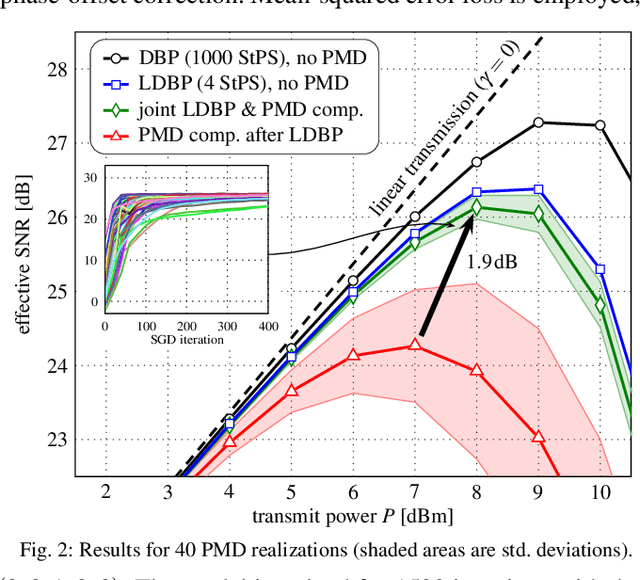Rick M. Bütler
Model-Based Machine Learning for Joint Digital Backpropagation and PMD Compensation
Oct 23, 2020

Abstract:In this paper, we propose a model-based machine-learning approach for dual-polarization systems by parameterizing the split-step Fourier method for the Manakov-PMD equation. The resulting method combines hardware-friendly time-domain nonlinearity mitigation via the recently proposed learned digital backpropagation (LDBP) with distributed compensation of polarization-mode dispersion (PMD). We refer to the resulting approach as LDBP-PMD. We train LDBP-PMD on multiple PMD realizations and show that it converges within 1% of its peak dB performance after 428 training iterations on average, yielding a peak effective signal-to-noise ratio of only 0.30 dB below the PMD-free case. Similar to state-of-the-art lumped PMD compensation algorithms in practical systems, our approach does not assume any knowledge about the particular PMD realization along the link, nor any knowledge about the total accumulated PMD. This is a significant improvement compared to prior work on distributed PMD compensation, where knowledge about the accumulated PMD is typically assumed. We also compare different parameterization choices in terms of performance, complexity, and convergence behavior. Lastly, we demonstrate that the learned models can be successfully retrained after an abrupt change of the PMD realization along the fiber.
Revisiting Multi-Step Nonlinearity Compensation with Machine Learning
Apr 22, 2019


Abstract:For the efficient compensation of fiber nonlinearity, one of the guiding principles appears to be: fewer steps are better and more efficient. We challenge this assumption and show that carefully designed multi-step approaches can lead to better performance-complexity trade-offs than their few-step counterparts.
 Add to Chrome
Add to Chrome Add to Firefox
Add to Firefox Add to Edge
Add to Edge